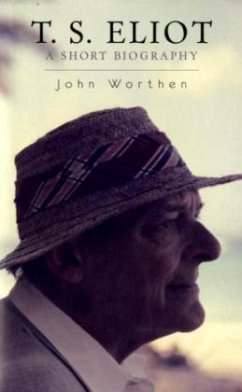Biographical writing about Eliot is in a more confused and contested state than is the case with any other major twentieth century writer. No major biography has been released since the publication of his early poems, "Inventions of the March Hare", in 1996, which radically altered the reading public's perception of Eliot. There have been attempts to turn the American woman Emily Hale into the beloved woman of Eliot's middle years; and Eliot has also been blamed for the instability of his first wife and declared a closet homosexual. This biography frees Eliot from such distortions, as well as from his cold and unemotional image. It offers a sympathetic study of his first marriage which does not attempt to blame, but to understand; it shows how Eliot's poetry can be read for its revelations about his inner world. Eliot once wrote that every poem was an epitaph, meaning that it was the inscription on the tombstone of the experience which it commemorated. His poetry shows, however, that the deepest experiences of his life would not lie down and die, and that he felt condemned to write about them.
Bitte wählen Sie Ihr Anliegen aus.
Rechnungen
Retourenschein anfordern
Bestellstatus
Storno

